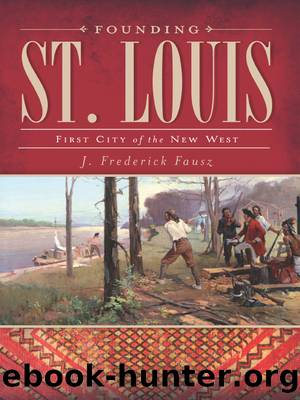Founding St. Louis by J. Frederick Fausz

Author:J. Frederick Fausz
Language: eng
Format: epub
Publisher: Arcadia Publishing
Published: 2012-09-15T00:00:00+00:00
NOUS NE SOMMES PAS TOUT DES SAUVAGES (âWE ARE NOT ALL SAVAGESâ)
Nous sommes touts Sauvages (âWe are all savagesâ) was the ominous message that several French deserters from LaSalleâs Fort Crevecoeur carved on a piece of wood in 1680 before fleeing into the forest. The defiant declaration by desperate individuals who abandoned familiar countrymen and resisted traditional subordination was a warning that close and frequent contact with Indians could make Europeans âwild,â unleashing cultural contradictions they could neither comprehend nor control.182
Ninety years later, the French established an even more ambitious and long-term multicultural society at St. Louis that confronted the same issues: how many alien beliefs and behaviors could Europeans accommodate and/or adopt without becoming people they did not recognize or respect? Anarchy and tyranny were equal threats to social survival in a new settlement without a permanent priest to instill the moral teachings of the church or a strong royal governor to enforce the secular laws of the state. But neither resulted because the Illinois French were already comfortable with a community of negotiable conformity that indulged the freedom of individual behavior within established boundaries. St. Louis was perhaps the only place on the planet administered so congenially by resident and well-known French officials who lacked the French kingâs authority. In a consensual society, deference paid to the heroic old commandant and respect for the notaryâs knowledge of customary law sufficed to maintain social order while avoiding authoritarianism. âCivilizedâ behavior thrived in the âwildernessâ because the émigrés from Illinois had long experience with a deferential society composed of masses and marines, patriarchal parenting and nosy neighbors, and they moderated their individualism in order to preserve community harmony. French St. Louisans were already well aware of what constituted crime and sin, and their greatest fear was being ostracized from the affection and protection of traditional village life, especially in a potentially threatening territory. They proved that contact with Indians did not promote savagery or stamp out the culture of oneâs upbringing, since hunters in deep forests, traders at distant villages and voyageurs on long expeditions yearned to return to congenial homes of reassuring familiarity.
As a mirror image of French Illinois culture, St. Louis experienced almost seven years of good luck in having new colonists create the society they wanted without outside interference or official coercion. Residents were free to experiment with social organization, but most found it hard to improve on the traditional Illinois system of local village governance and individual compromise derived from âthe secret of real politenessâself denial.â And who could be discontented âin a country where one can kill moreâ¦than can be consumed, andâ¦everything is produced in plenty because the climate is favorable and the soil virginâ? If their new town was not an actual âState of Nature,â St. Louisans could still tell Rousseau and other French philosophers something about a frontier utopia, âwhere every Man is allowed to do what he will with his own Person and Property, consistent with other Menâsââliving âlike Indiansâ¦much better than Men under Tyranny and arbitrary Government.
Download
This site does not store any files on its server. We only index and link to content provided by other sites. Please contact the content providers to delete copyright contents if any and email us, we'll remove relevant links or contents immediately.
Niceville by Carsten Stroud(2824)
Tokyo by Rob Goss(2423)
Lonely Planet's Guide to Travel Photography by Lonely Planet(1853)
Letter to My Daughter by Maya Angelou(1836)
Arctic Dreams by Barry Lopez(1762)
The Source by James A. Michener(1598)
Tolkien, J. R. R. - The Fellowship of the Ring by Tolkien J. R. R(1530)
Ceremony In Death by J D Robb(1511)
Nothing to Envy by Barbara Demick(1436)
The Lord of the Rings: The Fellowship of the Ring, the Two Towers, the Return of the King by J. R. R. Tolkien(1426)
The Elements of Eloquence by Mark Forsyth(1410)
The Cities by K.A Knight(1305)
Epic Hikes of the World by Lonely Planet(1280)
The Price of Salt, or Carol by Patricia Highsmith(1272)
African Nights by Kuki Gallmann(1251)
The Fellowship of the Ring (The Lord of the Rings, Book 1) by J. R. R. Tolkien(1219)
The Safe Word by Karen Long(1094)
Trieste and the Meaning of Nowhere by Jan Morris(1090)
Lonely Planet Epic Drives of the World by Lonely Planet(1045)
